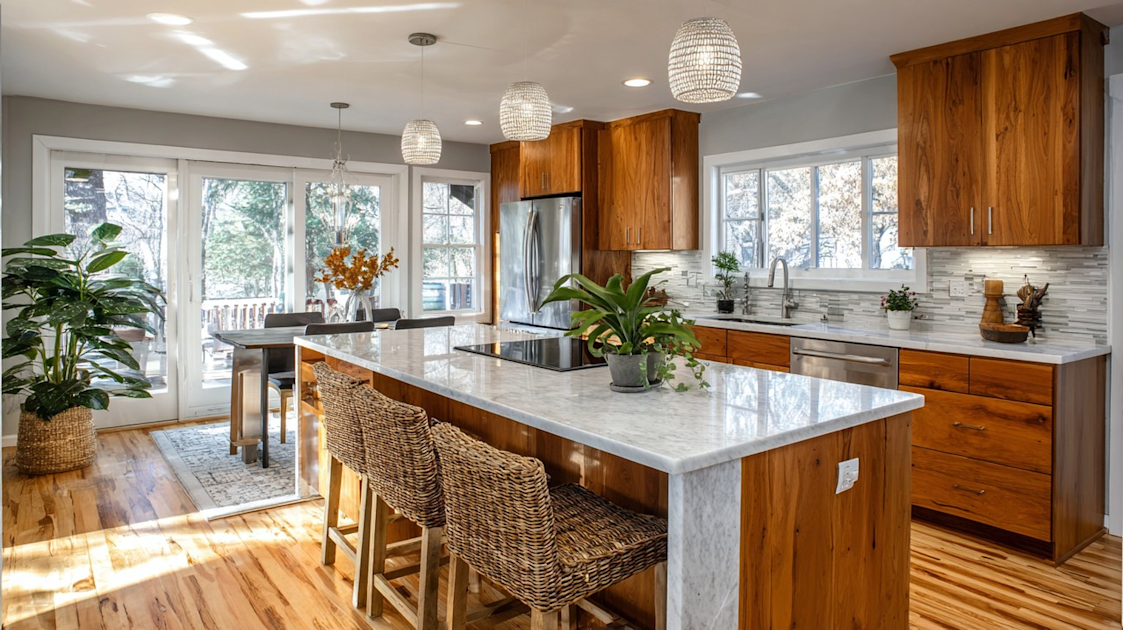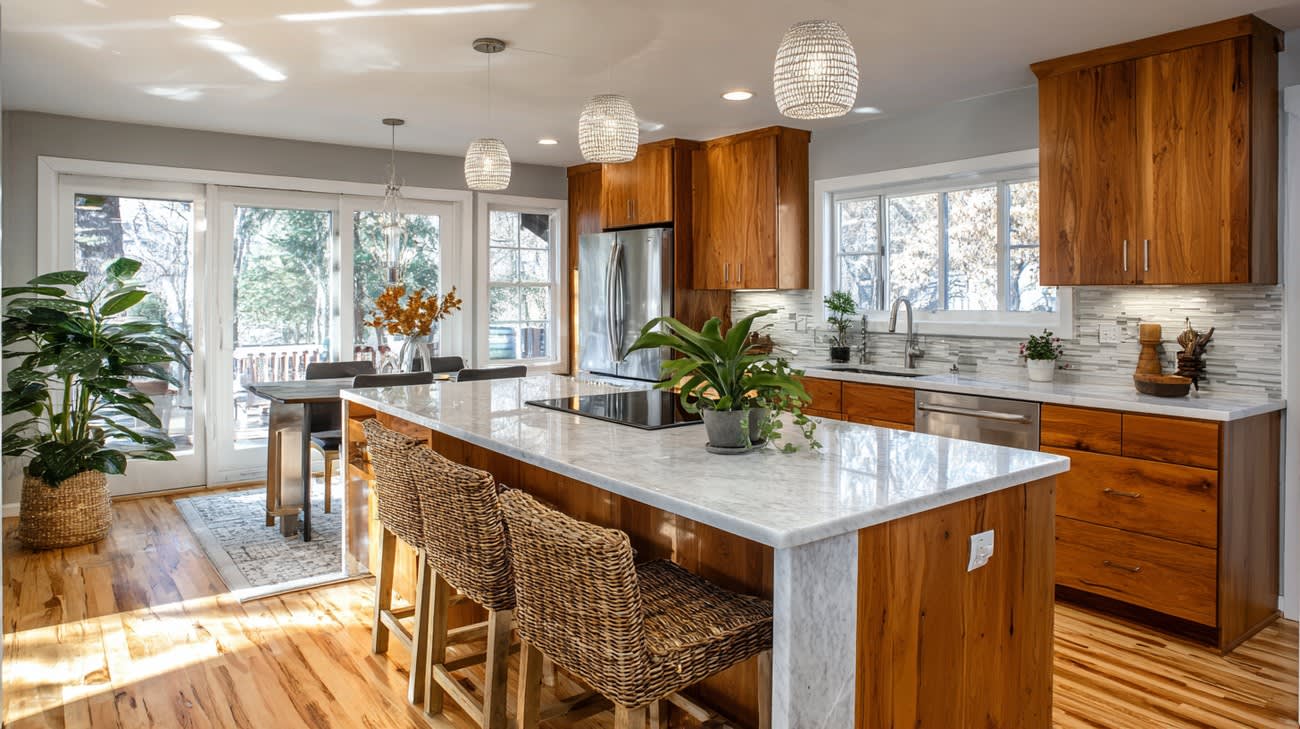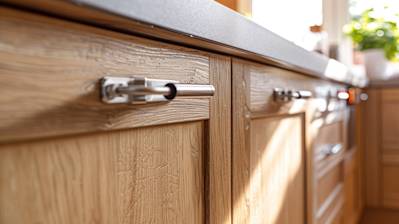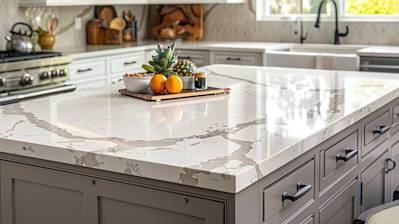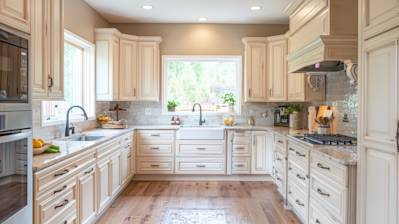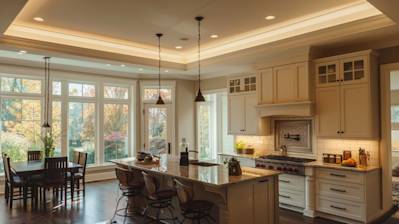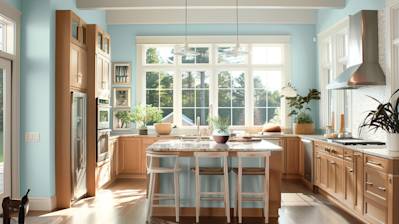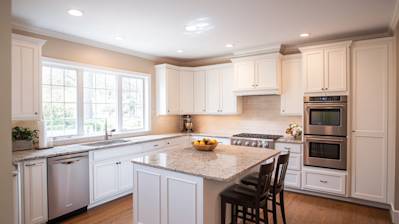Choosing the right flooring for your kitchen can be a considerable task. With an abundance of kitchen flooring options available in the market, the key is finding the most suitable one can withstand heavy foot traffic, spills, and stains. This comprehensive guide will explore varied kitchen flooring options, from the classic hardwood to modern vinyl, assisting you in making an informed decision for your home project.
Timeless and Classic: Hardwood Flooring
A popular choice amongst homeowners, hardwood floors offer a warm, classic appeal that never goes out of style. They easily pair with virtually any kitchen style, from farmhouse to modern. Hardwood floor types include oak, maple, and hickory, renowned for their durability. You can also consider exotic hardwoods like mahogany or teak for a more distinctive look.
- Longevity: Properly finished hardwood flooring can last for decades.
- Refinishing Capability: As your kitchen’s style evolves, hardwood flooring can be sanded and refinished to match the fresh look.
However, hardwood flooring involves a significant upfront cost, but their potential to withstand the test of time can make them a worthwhile investment.
Ultra-Durable: Porcelain Tile Flooring
A tough kitchen flooring option is porcelain tile. It's crafted from dense clay and fired at high temperatures, resulting in an extremely hard and durable material.
- Durability: Porcelain tiles resist cracking, even in severely cold temperatures.
- Water-Resistance: They have a less than 0.5% water absorption rate, making them nearly impervio us to liquids.
- Design Versatility: Available in many colors, shapes, sizes, and styles, porcelain tiles offer a wide spectrum of design possibilities.
Keep in mind, however, that porcelain tile can be cold and hard underfoot, and some types can be quite slippery when wet.
Cost-Effective and Comfortable: Vinyl Flooring
For those looking for a budget-friendly kitchen flooring option, vinyl is a good choice. It is available in sheets, tiles, or planks and comes in a variety of designs that replicate wood, stone, ceramic, and more.
- Water Resistance: Vinyl is completely waterproof, perfect for kitchens prone to spills and splashes.
- Comfort: Vinyl is softer underfoot than many other hard surfaces.
However, it's worth noting that while vinyl flooring's low cost and high durability make it an appealing option, it doesn’t offer the same longevity as porcelain or hardwood.
Eco-Friendly Pick: Cork Flooring
As a renewable resource, cork is an excellent choice for eco-conscious homeowners. This soft, flexible surface is a natural thermal insulator, providing the kitchen with a warm and comfortable feel.
- Comfort: Due to its softness, cork flooring is comfortable to stand on for long periods.
- Eco-Friendliness: From the harvesting process to its lifespan, cork flooring has a low environmental impact.
- Anti-Microbial Properties: Cork's natural properties can inhibit the growth of mold and bacteria.
On the downside, cork flooring requires regular sealing to keep it waterproof and can show dents over time from heavy appliances or furniture.
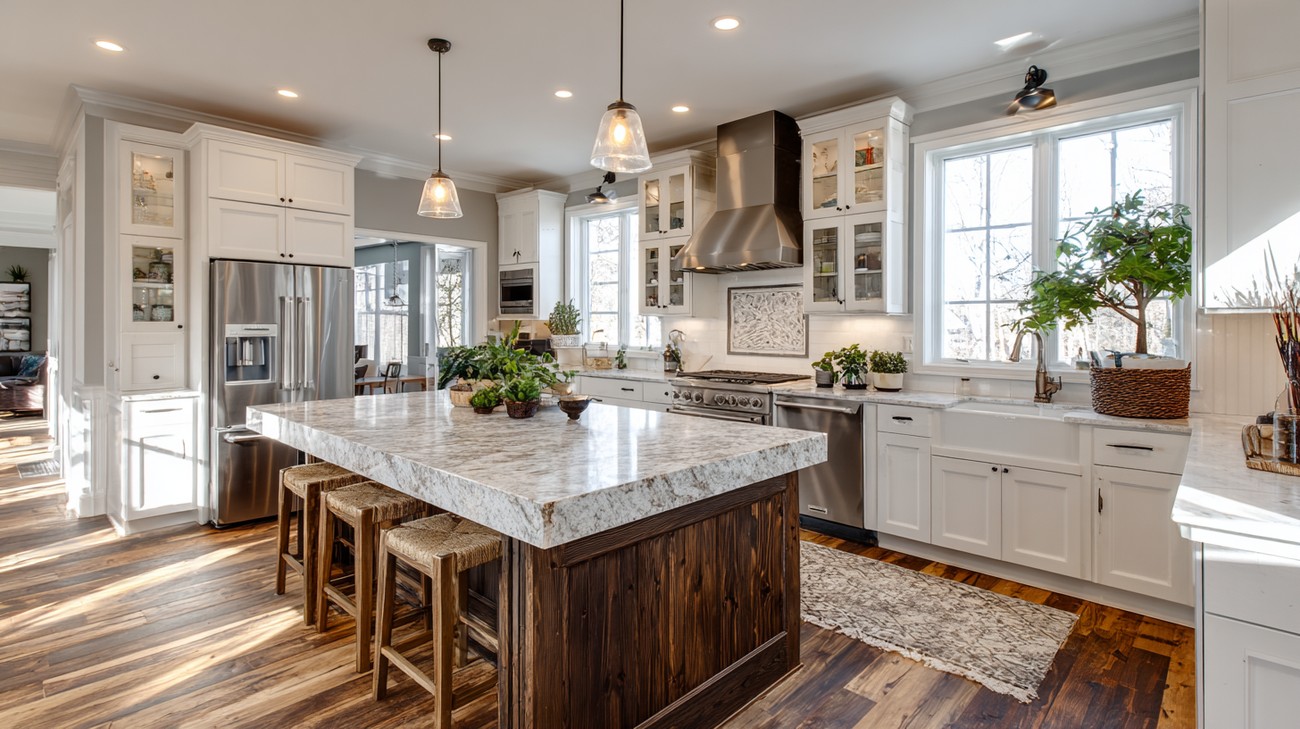
Frequently Asked Questions about Kitchen Flooring Options
How to choose the right flooring option for my kitchen?
The choice of kitchen flooring largely depends on your personal preference, budget, and needs. You should consider factors like durability, maintenance, style, comfort, and cost. For instance, if you have a high-traffic kitchen, you'll want durable floors, such as hardwood or tile. If comfort is your top priority, consider softer options like cork or vinyl.
Are hardwood floors a good option for kitchens?
Hardwood floors can indeed be a good option for kitchens. They are durable, easy to clean and add warmth and classic beauty to the room. However, they are susceptible to water damage. If you opt for hardwood, make sure to clean up any standing water quickly. Also, keep in mind that hardwood floors can be more expensive than other kitchen flooring options.
What are the most durable kitchen flooring materials?
Certain types of kitchen flooring like porcelain and ceramic tile, hardwood, and natural stone are renowned for their durability. These materials can withstand heavy foot traffic and are resistant to stains and water, making them excellent choices for the kitchen. However, they can be hard underfoot and may require regular maintenance.
Are there cost-effective kitchen flooring options?
Yes, there are several cost-effective kitchen flooring options that don’t compromise on quality. Laminate and luxury vinyl are known for their affordability, ease of installation, and durability. They come in a range of styles and colors, allowing you to create the look of more expensive materials like hardwood or stone without the high cost.
What is the easiest kitchen flooring to maintain?
Vinyl and laminate flooring are some of the most effortless kitchen flooring options to maintain. They are water- and stain-resistant and can be easily cleaned with a damp mop or household cleaners. However, avoid using abrasive brushes or cleaners as they can cause damage.
How long do kitchen floors typically last?
The lifespan of kitchen flooring varies depending on the material used. On average, hardwood and natural stone can last 100 years or more if properly maintained. Ceramic and porcelain tiles have a similar lifespan. Vinyl and linoleum floors can last 20-25 years, while laminate kitchen flooring typically lasts between 15-25 years.
What kitchen flooring options are suitable for homes with pets?
If you have pets, it’s best to consider kitchen flooring options that are scratch- and water-resistant. Vinyl, laminate and ceramic tiles are all great choices as they can withstand the demands of pets whilst also being easy to clean and maintain.

Hardwood
Pros
Long-lasting
Hardwood floors can literally last for decades. Their long lifespan means you won't need to replace your floor for a very long time, making hardwood a fantastic investment.
Aesthetically Pleasing
Hardwood is classic and can instantly elevate the look of your kitchen. Regardless of the overall design of your home, hardwood lends a timeless appeal that works with any interior.
Adds Value
Hardwood flooring can increase the resale value of your home. Buyers often prefer hardwood over other types of flooring due to its durability and elegance.
Cons
Expensive
Installing hardwood in your kitchen can be costly. Besides the cost of materials, you may need to hire a professional to install it. Improper installation can lead to problems down the line, including warping and damage.
Requires Maintenance
Without proper care, hardwood can warp or become discolored. Liquids can be easily absorbed, which can cause damage over time. Regular sealing is needed to keep the wood protected.
Laminate
Pros
Cost-Effective
Laminate flooring is a more affordable option than hardwood. It offers the appearance of real wood without the high price tag.
Easy to Install
Unlike hardwood, laminate is much more DIY-friendly. Its interlocking design simplifies the installation process, saving you time and possibly installation costs.
Resistant to Stains and Scratches
Laminate is designed to resist scratches and stains, making it a good choice for kitchens.
Cons
Not Very Durable
Laminate doesn’t have the same lifespan as hardwood. It can start to wear out after about 10 years, requiring replacement.
Can't Be Refinished
Unlike hardwood, which can be sanded and refinished multiple times, laminate is a one-time use product. If it’s damaged, you'll have to replace it.
Tile
Pros
Variety
With tile, you have endless choices in color, style, and materials including ceramic, porcelain, and stone.
Durable and Resistant
Tile is extremely resistant to damage and water. It doesn’t chip or crack easily, making it an excellent choice for high-traffic areas like the kitchen.
Cons
Cold and Hard
Tiles can be uncomfortably cold underfoot, especially in the winter. Additionally, their hard nature can be unforgiving, especially if you happen to drop something fragile.
Grout Maintenance
The grout used between tiles can stain and discolor over time. Regular cleaning is required to keep the grout looking its best.
Vinyl
Pros
Affordable
Vinyl is one of the most affordable flooring options. It's a great choice for those on a budget or for those who plan to renovate frequently.
Soft and Warm
Unlike tile, vinyl feels soft underfoot and is warmer to the touch.
Water-Resistant
Vinyl is a good option in wet areas like the kitchen. It's resistant to water and relatively easy to clean.
Cons
Durability
While vinyl is relatively durable, it’s not invincible. Sharp objects can easily cause scratches or gouges.
Difficult to Repair
If vinyl flooring gets damaged, you can't simply refinish it or replace a single piece like you can with tile or hardwood. Large sections may need to be replaced, which can be costly.
Concrete
Pros
Durability
Concrete is extremely durable and can withstand high foot traffic and stains. It's ideal for busy households or commercial kitchens.
Customizable
You can paint, stain, or stamp concrete to achieve a variety of looks. This level of customization means you can create a unique kitchen floor that’s tailored to your design preferences.
Cons
Hardness
While the hard nature of concrete contributes to its durability, it can also be uncomfortable to stand on for long periods, which is a common occurrence in kitchens.
Coldness
Like tile, concrete can be cold underfoot, especially in the winter. This can be mitigated with in-floor heating, but that's an added expense.
Cork
Pros
Comfortable
Cork floors have a bit of give to them, which can be more comfortable for long periods of standing compared to other types of kitchen flooring.
Eco-friendly
Cork is a renewable resource, making it a great choice for the environmentally conscious homeowner.
Cons
Requires Regular Maintenance
Cork needs to be sealed every few years to maintain its water resistance, which can be a bit of a hassle.
Susceptible to Scratches
Hard objects or small particles of dust and debris can scratch cork. Depending on the quality and finish of the cork, it might need regular refinishing.

Myths / Misconceptions about Kitchen Flooring Options
Myth 1: Hardwood Flooring is not Suitable for Kitchens
A Persistent Misconception
Perhaps one of the most persistent misconceptions about kitchen flooring options is that hardwood flooring isn't suitable for kitchens. This idea stems from the belief that the kitchen's frequent exposure to water and humidity could warp and damage the wood.
Hardwood Flooring in the Kitchen
The truth is, hardwood flooring can indeed be used in kitchens, and it often adds an unmatched beauty and warmth. With proper care and maintenance, your hardwood kitchen floor will keep its magnificent looks for many years.
Moreover, modern hardwood floors are typically pre-sealed to withstand occasional water spills. Needless to say, puddles should still be wiped up immediately to avoid water seeping into the wood. The sealant also protects the wood from stains resulting from dropped food and spills, which are inevitable in any kitchen.
Myth 2: Laminate Flooring Looks Cheap
Origin of the Myth
Laminate flooring has often been viewed as the 'cheap and cheerful' option that fails to match up in quality or appearance with other flooring options. This misconception likely emerged in the early years of laminate flooring, when technology and designs were not as sophisticated as they are now.
Realities of Modern Laminate Flooring
In reality, modern laminate kitchen flooring options can mimic almost any type of hardwood or stone with their high-resolution images under a clear protective layer. These floors stand up well to wear and tear, and they’re great for high-traffic areas such as the kitchen. They're also much easier on the budget than most other options, but do not lack in aesthetics.
Myth 3: Stone and Ceramic Tile are the Best
The Misconception
Many homeowners believe that stone or ceramic tile flooring is the best option for kitchens, mainly because of their durability and easy maintenance.
The Counter-Argument
While it's true that stone and ceramic tile flooring are durable, they are not necessarily the best for everyone. These flooring options can be cold and hard underfoot, which can be a big downside for those who spend a lot of time in the kitchen. They can also be quite loud when walked on, contributing to a higher noise level in your home.
Furthermore, dropping pots, pans, or dishes on a stone or ceramic floor will usually result in a break. So, although these types may be durable in some respects, they can potentially be more prone to causing damage to other things.
Myth 4: Vinyl Flooring is Outdated
Where it Comes From
Vinyl flooring’s bad reputation likely came from older styles that had a noticeably artificial appearance, hence it is commonly seen as outdated.
Why it’s Incorrect
Vinyl has come a long way and is now available in a myriad of styles and designs, including options that closely mimic wood, stone, and ceramic. It is easy to install, easy to clean, and is one of the more affordable kitchen flooring options.
Additionally, modern luxury vinyl is thicker and more durable, offering more insulation and comfort underfoot than its predecessor. It's also waterproof, making it a good option for kitchens.
In conclusion, don't let myths and misconceptions dictate your choice of kitchen flooring. Gather all the available information, consider your personal needs and preferences, and then make an informed decision that is right for your circumstances.
Summary
When it comes to designing or remodeling a part of your house, choosing the right kitchen flooring options can make a significant difference. There are many materials, styles, and colors available for your kitchen floor which won't just satisfy your aesthetic taste but also be practical and durable. You can go for traditional choices like hardwood or tiles, or explore more innovative materials like bamboo or cork.
Your choice of kitchen flooring options can also reflect your lifestyle. If you're regularly cooking and often stand for a long period, you may prefer softer alternatives like vinyl or cork. If you have a busy household with kids and pets, you might opt for durable materials like tiles or laminated flooring that can withstand heavy traffic.
Ultimately, the right kitchen flooring options for you depend on your needs and preferences. Don't just go for what looks best, but also consider the maintenance, durability, and your budget. No matter what choice you go with, a carefully chosen kitchen floor can add beauty, warmth, and character to one of the busiest areas of your home. So take your time browsing through different options and choose one that best fits your vision for your dream kitchen.
About Pro Tile & Remodeling
Meet Pro Tile & Removing of Greenville, SC - your trusted partner for all your tile and remodeling needs. We're a locally owned and operated company with years of experience in transforming homes. No project is too big or small for us - from simple tile installation to full-scale remodeling. We don't just work on your home, we take the time to understand your vision and turn it into reality. Our team of skilled professionals is committed to delivering quality workmanship and customer satisfaction. We make the remodeling process easy and enjoyable. So when you're ready to give your home a fresh new look, Pro Tile & Remodeling of Greenville, SC is the way to go!

